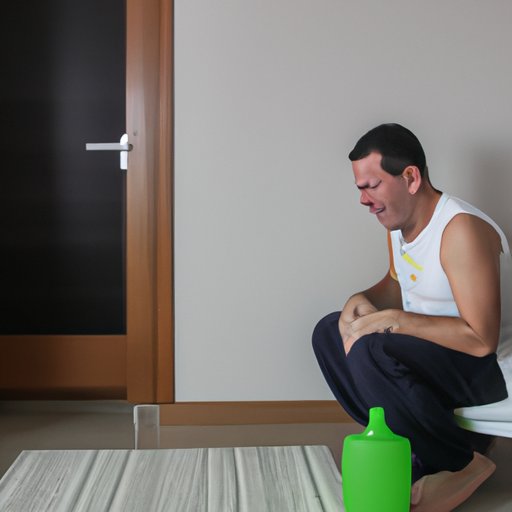Introduction
Constipation is a common digestive issue in which stools become hard, dry, and difficult to pass. It is often accompanied by symptoms such as bloating, abdominal pain, and feeling full after only a few bites of food. Constipation is usually caused by a lack of dietary fiber, inadequate fluid intake, or not getting enough physical activity. Fortunately, there are several home remedies that can help relieve constipation quickly and effectively.
Increase Your Fiber Intake
Fiber is an important nutrient that helps keep the digestive system running smoothly. Eating foods high in fiber helps add bulk to stools, making them softer and easier to pass. Additionally, fiber helps draw water into the intestines, which helps soften stool and reduce constipation.
Some good sources of fiber include fruits, vegetables, whole grains, legumes, nuts, and seeds. It’s important to increase your fiber intake gradually to give your body time to adjust. Consuming too much fiber too quickly can lead to gas, bloating, and abdominal cramps.
Here are some tips for increasing your fiber intake:
- Include fruits and vegetables with every meal.
- Choose whole-grain breads, cereals, and pastas instead of refined grains.
- Add beans, lentils, and chickpeas to salads and soups.
- Snack on dried fruit, nuts, and seeds.
- Drink plenty of fluids when consuming high-fiber foods to help them move through your digestive tract.
Drink Plenty of Water
Staying hydrated is essential for preventing and relieving constipation. When you don’t drink enough water, stool can become dry and difficult to pass. Additionally, drinking plenty of water helps to soften stool and keep it moving through the intestines.
Aim to drink at least 8 glasses of water per day. Additionally, you can also increase your fluid intake by drinking unsweetened tea, low-sodium vegetable juice, and other healthy beverages.
Here are some tips for increasing your water intake:
- Carry a reusable water bottle with you throughout the day.
- Keep a pitcher of water in the refrigerator so it’s always cold and ready to drink.
- Set reminders on your phone or computer to drink a glass of water.
- Flavor your water with fresh fruit, herbs, or cucumber slices.
- Eat plenty of hydrating fruits and vegetables such as watermelon, cucumber, celery, and tomatoes.
Exercise Regularly
Physical activity can help stimulate digestion and relieve constipation. Regular exercise helps to strengthen the muscles in the abdomen, which helps move stool through the intestines. Additionally, exercise helps to reduce stress, which can contribute to digestive issues.
Aim to get at least 30 minutes of physical activity every day. This can include activities such as walking, jogging, swimming, cycling, dancing, and yoga.
Take Over-the-Counter Laxatives
If home remedies aren’t working, you may want to consider taking an over-the-counter (OTC) laxative. OTC laxatives come in a variety of forms, including tablets, capsules, liquids, and suppositories. They work by softening stool, increasing fluid in the intestines, and stimulating the muscles in the colon.
When taking OTC laxatives, be sure to follow the directions on the package. Depending on the type of laxative, you may need to take it with meals or at bedtime. Additionally, it’s important to note that laxatives are only intended for short-term use. If you find that you need to take laxatives regularly, talk to your doctor about other options.
It’s also important to be aware of potential side effects, which can include abdominal cramping, nausea, vomiting, and diarrhea. If you experience any of these side effects, stop taking the laxative and contact your doctor.
Eat Probiotic Foods
Probiotics are beneficial bacteria that can help improve digestive health and reduce constipation. Probiotic foods contain live microorganisms that help balance the levels of good and bad bacteria in the gut. Additionally, probiotics can help break down food more efficiently, which can help prevent constipation.
Examples of probiotic foods include yogurt, kefir, kimchi, sauerkraut, miso, and tempeh. Additionally, you can also take probiotic supplements to get the beneficial bacteria your body needs.
Try Natural Remedies
There are several natural remedies that can help relieve constipation. These include herbal teas, castor oil, magnesium citrate, and prune juice. Herbal teas such as chamomile, ginger, peppermint, and fennel contain compounds that can help relax the muscles in the digestive tract. Castor oil and magnesium citrate both act as a mild laxative, while prune juice helps to soften stool and increase motility.
When using natural remedies, it’s important to start with small doses and increase gradually if needed. Additionally, it’s important to be aware of potential side effects, which can include stomach cramps, nausea, and diarrhea. If you experience any of these side effects, stop taking the remedy and contact your doctor.
Consult a Doctor
If home remedies and OTC treatments aren’t working, it’s important to consult a doctor. Your doctor can help determine the underlying cause of your constipation and provide treatment options. Additionally, they can help rule out any serious conditions that may be causing your constipation.
It’s important to consult a doctor if:
- Your constipation has lasted more than two weeks.
- You’re experiencing severe abdominal pain.
- You’re losing weight without trying.
- You’re having difficulty passing stools.
- You’re experiencing blood in your stool.
When consulting a doctor, be sure to mention any medications you’re taking, any recent changes in diet or lifestyle, and any other symptoms you may be experiencing. Additionally, ask your doctor about any tests they may recommend to help diagnose the cause of your constipation.
Conclusion
Constipation can be a frustrating and uncomfortable condition. Fortunately, there are several home remedies that can help relieve constipation quickly and effectively. These include increasing your fiber intake, drinking plenty of water, exercising regularly, taking over-the-counter laxatives, eating probiotic foods, and trying natural remedies. If home remedies and OTC treatments aren’t working, it’s important to consult a doctor.


